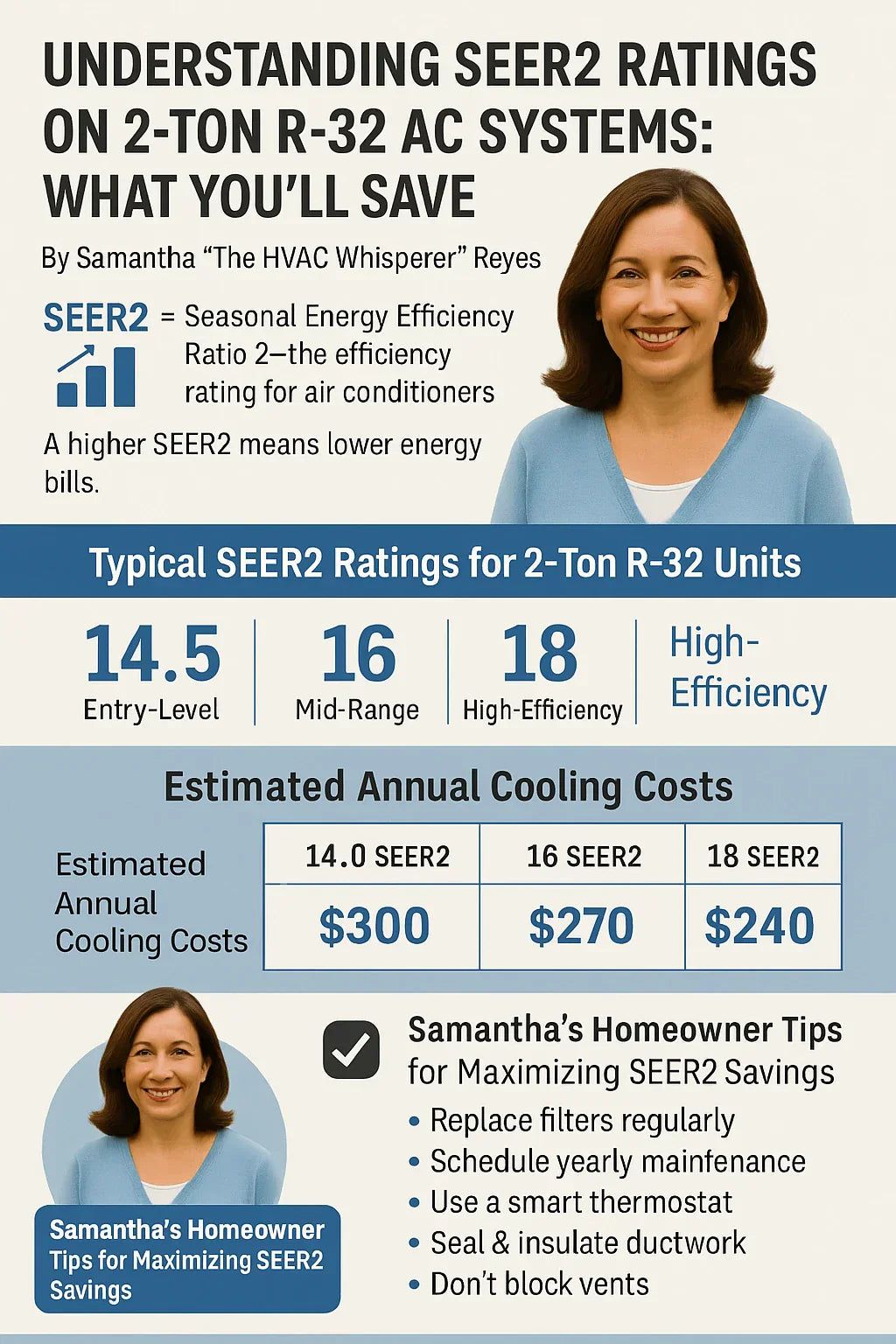By Samantha “The HVAC Whisperer” Reyes
🌟 Introduction: Why SEER2 Matters in 2025
When you’re buying a 2‑ton R‑32 AC system in 2025, one of the most important numbers you’ll see is the SEER2 rating.
It’s not just a number on a sticker—it’s the difference between high energy bills and real monthly savings. With new Department of Energy standards taking effect in 2023, SEER2 has become the official way to measure AC efficiency. And since R‑32 is the new refrigerant standard replacing R‑410A, knowing how SEER2 works will help you decide which unit fits both your home and your budget.
Let’s dive into what SEER2 means, how it impacts your bills, and what kind of savings you can expect when choosing a 2‑ton R‑32 system.
📊 1. What Is SEER2?
📌 Definition
SEER2 (Seasonal Energy Efficiency Ratio 2) measures the cooling output of an AC system divided by the energy it consumes, adjusted for real‑world conditions like duct losses and external static pressure.
Think of it like miles per gallon for your AC—the higher the SEER2, the more cooling you get for each watt of electricity.
🔄 SEER vs. SEER2
-
Old SEER test: Lab‑based, ideal conditions.
-
New SEER2 test: Reflects realistic duct pressures and airflow restrictions.
This means a system rated 16 SEER under the old standard might only be 15.2 SEER2 under the new one (DOE Efficiency Standards).
❄️ 2. Typical SEER2 Ratings for 2‑Ton R‑32 Units
In 2025, most 2‑ton R‑32 AC systems fall within this range:
-
Entry‑Level: 14.5 SEER2
-
Mid‑Range: 16 SEER2
-
High‑Efficiency: 18–20 SEER2
🌱 Why R‑32 Helps Boost Efficiency
R‑32 refrigerant has:
-
Higher heat transfer capacity than R‑410A.
-
20–30% less refrigerant volume needed.
-
Lower compressor workload = better efficiency (EPA Refrigerant Transition Updates).
That means SEER2 ratings are easier to achieve with R‑32 than with older refrigerants.
💰 3. How SEER2 Impacts Your Energy Bills
Let’s put numbers on the table.
🔢 The Formula
If you know your cooling load and electricity cost, you can estimate savings:
📉 Example: 2‑Ton R‑32 AC in a 1,200 Sq Ft Home
-
Cooling load: ~24,000 BTUs/hour
-
Usage: ~1,200 hours per year (varies by climate)
-
Electricity rate: $0.15 per kWh
| SEER2 Rating | Annual kWh Used | Estimated Annual Cost |
|---|---|---|
| 14.5 SEER2 | ~1,986 kWh | ~$298 |
| 16 SEER2 | ~1,800 kWh | ~$270 |
| 18 SEER2 | ~1,600 kWh | ~$240 |
Savings over 10 years:
-
16 SEER2 vs. 14.5 = ~$280
-
18 SEER2 vs. 14.5 = ~$580
🌱 4. Rebates & Tax Credits Linked to SEER2
Here’s where the real payoff comes in.
🏛️ Federal Incentives
The Inflation Reduction Act (IRA) provides:
-
Up to $2,000 tax credit for qualifying AC systems (SEER2 ≥16).
(Energy Star)
🌍 State & Utility Rebates
-
Many states and utilities offer $200–$1,500 rebates for high‑efficiency ACs.
-
Use DSIRE USA to find programs in your area.
🏷️ Manufacturer Promotions
Brands like Goodman and Carrier often run seasonal rebates to make high‑SEER2 systems more attractive.
🏠 5. SEER2 Ratings and Climate Zones
The hotter your climate, the more a high SEER2 pays off.
🌡️ Example Zones
-
Hot-Humid (e.g., Florida, Texas): 18+ SEER2 recommended for max savings.
-
Mixed-Humid (e.g., Midwest, Mid-Atlantic): 16 SEER2 is a smart balance.
-
Cool (e.g., Northern U.S.): 14.5–16 SEER2 may be sufficient.
🔧 6. Pairing SEER2 with Proper Sizing
Efficiency isn’t just about the SEER2 number. Proper sizing is equally important.
📐 Why It Matters
-
Oversized system: Short cycles, poor humidity control, wasted energy.
-
Undersized system: Constant running, high bills, uncomfortable rooms.
A Manual J load calculation ensures the 2‑ton system is right for your home size and insulation. Typically:
-
900–1,200 sq ft in hot climates.
-
1,200–1,400 sq ft in moderate climates.
📦 7. Samantha’s Homeowner Tips for Maximizing SEER2 Savings
Want to make sure your system delivers the efficiency it’s rated for? Follow my checklist:
-
🧹 Replace filters every 1–3 months.
-
🏠 Seal and insulate ductwork—leaky ducts can cut efficiency by 20%.
-
📱 Use a smart thermostat to reduce cooling when you’re away.
-
🧯 Keep vents and returns unblocked for proper airflow.
-
🛠️ Schedule annual maintenance to keep coils clean and refrigerant levels correct.
🏁 Conclusion: SEER2 = Real Savings
Choosing the right SEER2 rating on your 2‑ton R‑32 AC system could mean the difference between paying too much for electricity—or enjoying hundreds of dollars in savings each year.
✅ Go for at least 16 SEER2 to qualify for rebates.
✅ Consider 18 SEER2 or higher in hot climates.
✅ Pair your system with a Manual J calculation for correct sizing.
When installed and maintained properly, a high‑SEER2 R‑32 unit is more than just an AC—it’s a smart investment in comfort, compliance, and long-term savings.
In the next topic we will know more about: How to Maintain Your 2-Ton R-32 AC for Long-Term Performance







